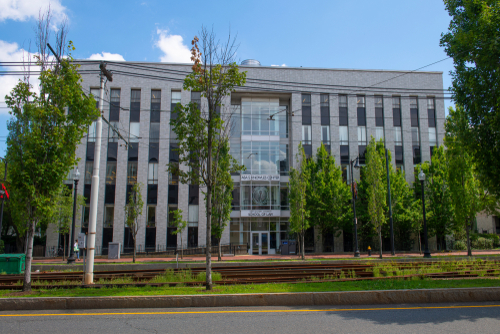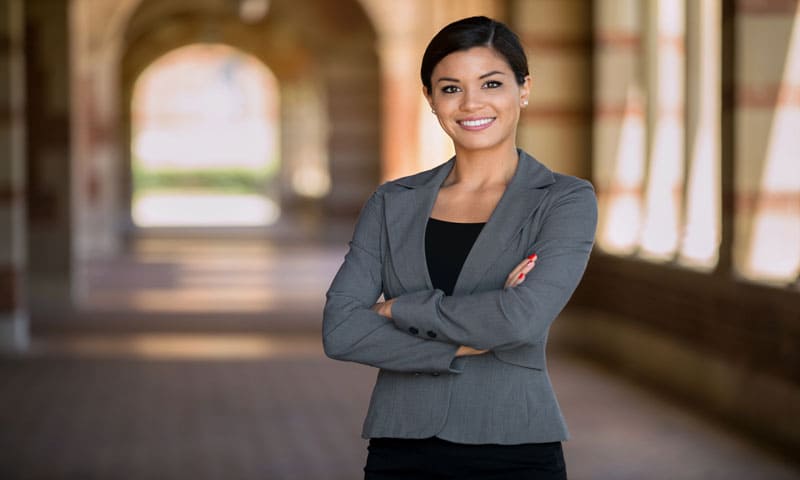Northwestern University’s law school, which focuses on social justice lawyering and experiential learning, has been named the top US law school for public interest law.

The Northwestern University School of Law was named top in the nation for public interest law. Its graduates include a state attorney general who sued a debt collection company, a pending White House nominee for the top federal prosecutor in Massachusetts and a former U.S. senator.
Northeastern was rated No. 1 in PreLaw magazine’s recently published “Back to School” issue, which is aimed at prospective law students. Featured on the cover is Emily Massell, a second-year student and associate editor of the Northeastern University Law Review.
“Northeastern University is a prime example of a school that places an emphasis on funneling lawyers into that field,” the magazine wrote in the article titled “Best Schools for Public Service.”
Northeastern has been recognized for its public service work in the past, but it was only in third place as recently as 2020. Northeastern University topped the list this year, beating the City University of New York and several UC institutions.
The schools were graded based on three categories: employment, field-relevant curricula, and loan repayment options.
In addition to being ranked nationally, Northeastern Law is also ranked nationally because of its emphasis on experiential learning and social justice law, according to professors.

James Hackney, dean of Northeastern’s law school since 2018, says public interest entails everything from immigration law to public health to representing victims of domestic violence. “It means an impact on society, which is important for us as law schools,” he explains.
The public interest has traditionally been viewed through a narrow frame based mainly on direct client representation, says Hackney, but there are many other ways to affect the public interest.
Hackney cites Northeastern’s Center for Public Interest Advocacy and Collaboration (CPIAC), which works closely with the Center for Law, Innovation, and Creativity and the Center for Health Policy and Law. “All three of them intersect, so although one is designated as public interest, the other two have public interest implications as well.”
Stephanie Hartung is a resident fellow at the CPIAC, where she is involved with our Cradle-to-Prison (C2P) Pipeline research project, an interdisciplinary venture that studies the processes that send children and youth into jails.
As director of the school’s Legal Skills in Social Context program, she offers first-year law students the opportunity to work in a non-profit legal organization to address systemic inequities in the law, including housing, voting rights, education, and criminal justice.
“Through this collaborative work, students not only develop critical lawyering skills such as collaboration, creative thinking, and problem-solving, but they are also exposed to ongoing systemic inequities and work side-by-side with organizations seeking to address them in meaningful ways,” says Hartung, who started her career as a public defender.
Northeastern’s public interest work is recognized nationally, she notes, “illustrates what Northeastern Law students already know- that through their law school curriculum, co-op experiences, and clinical experience they can become conscientious lawyers.”
Hackney reports that graduates of the class of 2021 conducted 137,000 hours of public interest co-ops, with 36 percent landing public interest jobs.
Morgan Wilson graduated from the law program in 2017 and currently works at the university’s Domestic Violence Institute as a legal fellow. Clients often have multiple legal issues going on at the same time when she works there.
“Someone facing abuse might choose to stay in a difficult relationship because they’re concerned about housing instability and food instability. They have kids. They might be a homemaker. They’re concerned that they don’t have the financial capital to move out. They might be concerned about their immigration status,” Wilson says.
One of the distinguishing characteristics of Northeastern Law is that it looks at clients in their entirety, beyond the legal aspects of their case.
“The university recognizes the importance of holistic lawyering that includes wraparound care,” she says. “That manifests in both the way that they teach their doctrinal classes and their elective offerings as well as their clinical program.”
It was always Wilson’s dream to be able to help others through her career. During the Obama administration, she was a political appointee at the Justice Department. Then she saw how sentencing disparities, lack of constitutional protections, and access to justice issues impacted certain groups differently.
“So for me, I always knew that legal services are where I wanted to end up,” she says. “When I looked at law schools, I looked at schools where I knew that that interest in serving others would be not only recognized but prioritized.”
According to Hartung, the law faculty are fortunate to instruct students who have such passion for justice, especially those who have served as community activists and reformers prior to attending law school.
“It is a joy and an inspiration to teach students who we know to have the capacity to change law and policy for the better in meaningful ways,” she says.
















































